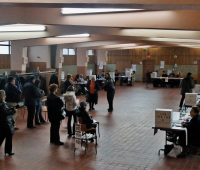Rarely do we get a sense of how conservative white working class Americans view the civic competence of urban-based liberals. Katherine Cramer provides such a perspective in this Democracy Paper, building on the extensive research for her book on rural Wisconsites with follow-up visits during the 2016 election campaign and the early days of the Trump administration. Cramer finds a very deep and mutual lack of faith, a chasm that makes the possibility for building alliances, or even dialogue, across polarized groups a difficult one.
Can representative democracies be strengthened to govern more effectively? The SSRC’s Anxieties of Democracy program is motivated by a concern about whether the core institutions of established democracies can capably address large problems in the public interest. The “Democracy Papers” highlight and summarize new research presented at conferences and workshops related to the Anxieties of Democracy program. Throughout the SSRC’s history, it has organized and sponsored committees and conferences on democracy, both in the United States and abroad. Most recently, before the Anxieties of Democracy program, the SSRC convened the National Research Commission on Elections and Voting in 2004, culminating in the publication of the report, Challenges Facing the American Electoral System: Research Priorities for the Social Sciences.
If you enjoy the “Democracy Papers,” you may also like our collection of reflection essays on the anxieties of democracy, The Inaugural Democracy Papers. These pieces were collected for the launch of the Anxieties of Democracy program in 2014–15.
Themes


The Loss of (Democratic) Visions and the Unequal Future
by Regina KreideIn this Democracy Paper, Regina Kreide traces the different ways in which social inequality can, and is, undermining democratic politics. Kreide breaks down inequality into three dimensions—growing economic cleavages, deepening political segregation, and cultural invisibility. These trends combine to diminish many citizens’ faith in the future and open the door to populist appeals. The author argues that reversing democratic decline and ultimately inequality itself will take more thoroughgoing collective action beyond piecemeal reforms.

Disturbances Take Precedence: Why We Need to Regain the Procedural Consensus
by Claudia LandwehrOver the next months, Items will publish essays based on research presented at a spring workshop on the theme “Democratic Participation: A Broken Promise?” cosponsored by the SSRC’s Anxieties of Democracy program’s Participation group and the German-based Democratic Anxieties. Claudia Landwehr, co-organizer of Democratic Anxieties, describes the fraught efforts of democracy to deal with “disturbances”—deep tensions that put at risk agreement on democratic procedures and the norms of reciprocity that undergird it. Landwehr argues for practices of “meta-deliberation” to draw publics into discussion about the norms through which reciprocity and procedural consensus are produced.

Political Inequality in Affluent Democracies
by Larry M. BartelsOver the next months, Items will publish essays based on research presented at a spring workshop on the theme “Democratic Participation: A Broken Promise?” cosponsored by the SSRC’s Anxieties of Democracy program’s Participation group and the German-based Democratic Anxieties. Here, Larry Bartels, cochair of the AOD Participation group, draws on recent work on the extent to which established democracies are disproportionately responsive to the preferences of their wealthiest citizens. While this is not news for observers of the United States, Bartels finds very similar patterns across what are often assumed to be the more egalitarian democracies of Europe.

Anxieties of Climate Change: Thoughts from the SSRC Working Group on Climate Change
by Robert O. Keohane and Nancy L. RosenblumWhy has climate change been so difficult to address through democratic institutions and processes? The SSRC’s Anxieties of Democracy program established a working group to engage this question. Robert O. Keohane and Nancy L. Rosenblum, cochairs of the working group, provide a sense of the issues that have animated its work thus far: mobilization for climate change, the politics of mitigation strategies, and the often neglected role of emotion in democratic participation.

Is Democracy Slipping Away?
by Charles TaylorThis essay by Charles Taylor draws from a lecture sponsored by the SSRC’s Anxieties of Democracy program, called "Ways Democracy Can Slip Away," on October 17, 2016, at Roosevelt House in New York City, and is copublished in The Democracy Papers. Taylor was the program’s 2016 Democracy Fellow. Speaking in the weeks before the 2016 US election, Taylor discusses the character of modern democracies and their vulnerability to what he call “spirals of decline.” He concludes with a reflection on the present populist moment.

“The Nearer Your Destination, the More You’re Slip-Sliding Away”: A Comment on Charles Taylor
by Nancy L. RosenblumNancy Rosenblum’s Items contribution is based on her response to Charles Taylor’s October Roosevelt House lecture, "Ways Democracy Can Slip Away," and also appears in The Democracy Papers. A member of the Anxieties of Democracy program’s Advisory Committee, Rosenblum reflects on Taylor’s arguments through the lenses of history and political philosophy. She ends on a note of contingent hope, emphasizing that democracy’s contemporary vulnerabilities are related to genuine advances in the quality of democracy over time.





